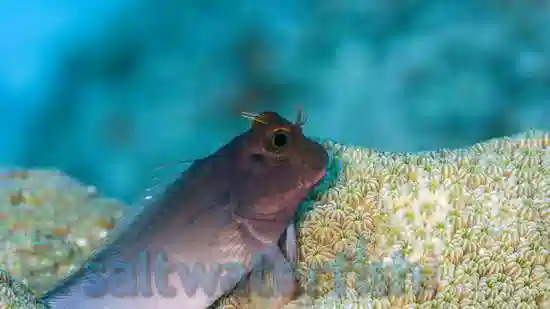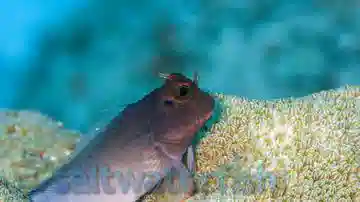Redlip Blenny
Ophioblennius macclurei
(1 Reviews)

Redlip Blenny
Ophioblennius macclurei
(1 Reviews)
{{ item.name }}
Size: {{ item.extra_field_3 }}
${{ getFormattedPrice(item.saleprice) }} ${{ getFormattedPrice(item.price) }}
To join the waiting list, click here
Free Shipping
With
$199.00
or more in Marine Life.
More details...
Redlip Blenny Care Facts
| Care Level: | Easy |
|---|---|
| Temperament: | Peaceful |
| Diet: | Omnivore |
| Reef Safe: | Yes |
| Minimum Tank Size: | 30 gallons |
| Max Size: | 5 inches |
Redlip Blenny (Ophioblennius macclurei) - A Captivating Addition to Your Saltwater Marine Aquarium
The Redlip Blenny (Ophioblennius macclurei) is a fascinating addition to saltwater marine aquariums, and this detailed product description aims to provide essential information for enthusiasts considering keeping this species.Habitat of the Redlip Blenny:
The Redlip Blenny is native to the western Atlantic Ocean and is commonly found along rocky shores and inshore reefs. They thrive in areas with ample hiding spots amidst rocks and crevices. In your aquarium, replicate this natural habitat by providing abundant live rock structures and caves for them to seek shelter and graze.
Reef Compatibility of Redlip Blenny:
Redlip Blennies are considered reef-safe. Their diet mainly consists of algae, which reduces the likelihood of them preying on corals. However, observing individual behavior is essential, as some may occasionally nip at soft corals or polyps.
Size and Lifespan of Redlip Blenny:
Redlip Blennies are relatively small, reaching an average length of 4 to 5 inches (10 to 13 cm). In captivity, they can live for up to 4 to 6 years with proper care.
Diet in Captivity:
The Redlip Blenny primarily feeds on algae and detritus in a home aquarium. Ensure a well-balanced diet by supplementing their food with high-quality marine flake or pellet food and occasional fresh seaweed or algae sheets. Maintaining a healthy algae population in the tank will help keep them well-fed.
Aquaculture and Availability:
Redlip Blennies are not commonly aquacultured but are seasonally available to hobbyists through reputable marine fish suppliers. Check with your local fish store or online retailers for availability.
Compatibility with Other Fish and Invertebrates:
Redlip Blennies are generally peaceful fish and can coexist with various tank mates. They get along with other community fish, such as clownfish, gobies, and smaller wrasse species. However, be cautious when housing them with larger, aggressive species, as the Redlip Blenny may become a target for harassment.
Sexual Dimorphism of Redlip Blenny:
Distinguishing between male and female Redlip Blennies can be challenging. Both sexes share similar external characteristics, making it difficult to determine their gender visually.
Juvenile to Adult Coloration Changes of Redlip Blenny:
Redlip Blennies exhibit a beautiful and vibrant coloration. As juveniles, they typically showcase a pale grey to tan body color with darker bands and spots. As they mature, their body transitions into a striking combination of bright red and blue hues, with a prominent red upper lip that gives them their name.
Temperament of Redlip Blenny:
Redlip Blennies are known for their curious nature. They often perch on rockwork, observing their surroundings and making occasional dashes to graze on algae. Their engaging behavior can add a charming aspect to your aquarium.
Tank Requirements for Redlip Blenny:
For a single Redlip Blenny, a minimum aquarium size of 30 gallons is recommended. However, it's essential to consider the available space for rockwork, as these fish require ample hiding spots. Ensure a secure lid as they jump out of open-top aquariums.
Water Conditions:
pH: Maintain a pH level between 8.1 and 8.4.
Salinity: Keep salinity levels within the range of 1.020 to 1.025.
Water Temperature: The ideal temperature for Redlip Blennies is 72-78°F (22-26°C).
Water Flow: Moderate water flow suits these fish, simulating their natural environment.
Common Names of Redlip Blenny:
The Redlip Blenny is also known as the Atlantic Redlip Blenny.
Five Compatible Tank Mates for Redlip Blenny:
- Clownfish (Amphiprion spp.): Known for their symbiotic relationships with anemones, clownfish make great tank mates with Redlip Blennies.
- Firefish Goby (Nemateleotris spp.): Firefish gobies share similar peaceful temperaments and are visually appealing additions to the tank.
- Royal Gramma (Gramma loreto): These colorful, reef-safe fish are compatible with Redlip Blennies and can cohabitate peacefully.
- Cleaner Shrimp (Lysmata spp.): Cleaner shrimp not only add diversity to your tank but also help maintain the health of your Redlip Blenny by providing cleaning services.
- Yellowtail Damsel (Chrysiptera parasema): These small and non-aggressive fish can coexist with Redlip Blennies in a peaceful community tank.
Why Choose Redlip Blenny from Saltwaterfish.com:
When considering where to acquire your Redlip Blenny, Saltwaterfish.com stands out as a reputable source for marine fish. Their commitment to providing healthy, sustainably sourced marine life ensures you receive a quality specimen. Moreover, their extensive experience in the industry and dedication to customer satisfaction make them a trusted choice for saltwater aquarium enthusiasts.
Conclusion:
In conclusion, the Redlip Blenny is an alluring and intriguing addition to your saltwater marine aquarium. Their captivating coloration and peaceful temperament make them an excellent choice for hobbyists seeking visually appealing and low-maintenance marine fish. When sourced from a reliable supplier like Saltwaterfish.com, you can be confident in the health and quality of your new Redlip Blenny, ensuring a delightful and thriving addition to your aquatic community.
The Redlip Blenny was shipped extremely well, and it was a perfect addition to my reef tank. I acclimated according to the instructions, and I have had no problems with any of the fish I have received. What more can you ask for? Cheaper then my local fish store and it was delivered to my front door the next day.
Reviewed by: Jamison Tillar on Sept. 11, 2021








